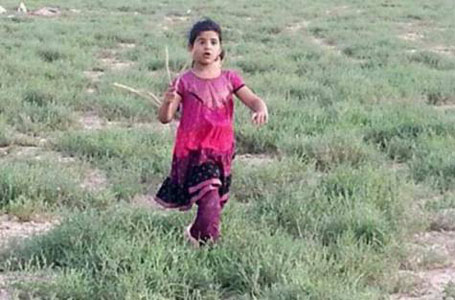 Manama: Saudis have given an emotional farewell to Lamees, the six-year-old girl who was killed in a gruesome murder by her domestic helper. The funeral was held on Tuesday evening as relatives, friends and neighbours gathered at the graveyard of Al Quay, in Bani Tamim, 150 kilometres south of the capital Riyadh, local daily Al Sharq reported.
Manama: Saudis have given an emotional farewell to Lamees, the six-year-old girl who was killed in a gruesome murder by her domestic helper. The funeral was held on Tuesday evening as relatives, friends and neighbours gathered at the graveyard of Al Quay, in Bani Tamim, 150 kilometres south of the capital Riyadh, local daily Al Sharq reported.
The father, Mohammad Al Salman, was visibly affected by the murder of his daughter and used his Twitter account to pay her rich homage. “This is my Lamees. I was overjoyed when she was born, carrying her around. Today, I carry her to her grave. I had never anticipated this moment. I was thinking of her as a bride,” he posted on his account. In other tweets, he reiterated his submission to God’s will and prayed for her soul.
Social media and microblog users shared their compassion with the father and expressed support. However, several users said that they blamed parents for leaving their children with “total strangers”. “Unfortunately, innocent children are made to pay for the anger, hatred and other pent-up feelings,” one blogger remarked.
Saudi Arabia has been shaken by the murder of Lamees reportedly by their 26-year-old Ethiopian helper. The police said they received a call late on Sunday evening from a family informing them that their child and helper were missing.
The police, dispatched to the family’s home, found Lamees in a pool of blood after her throat had been slit with a sharp object, most likely the knife found next to the lifeless body. They eventually found the helper hiding in a store behind the house and holding a cleaver, seemingly to defend herself.
However, she was brought under control and taken for investigations. She reportedly confessed she had killed the child. According to a local report, the woman, who had been employed for nine months, said that she could no longer bear the alleged ill-treatment she was receiving from the family and that she killed their daughter to exact revenge.
Tragic stories of murders and abuses involving families and domestic helpers have invariably sent shockwaves in the local and expatriate communities.
In March, an Indonesian domestic helper was sentenced to death after the court found her guilty of killing Tala, the daughter of her employers in the Red Sea city of Yanbu. The helper who had been with Tala’s family for seven years used a cleaver to end the child’s life while the father and mother were at work and the other two sisters at school.
No reason was given for the murder, but reports claimed that it was most likely linked to text messages the helper received from Indonesia on her mobile. Indonesian consulate officials in Saudi Arabia said that they would initiate legal action against the person who sent the messages from Indonesia that apparently led to the child’s murder.
The murder triggered a wave of sympathy for the family, especially as the father caused an accident in which two people were killed as he rushed home to help his distraught wife after she discovered the crime.
Several women teachers used the tragedy to press the education ministry to open nurseries in schools and help provide day care for their babies and young children. They said that most teachers, including the victim’s mother, were forced to leave their babies and toddlers at home in the care of helpers and that the situation was not always comfortable.(gn)
